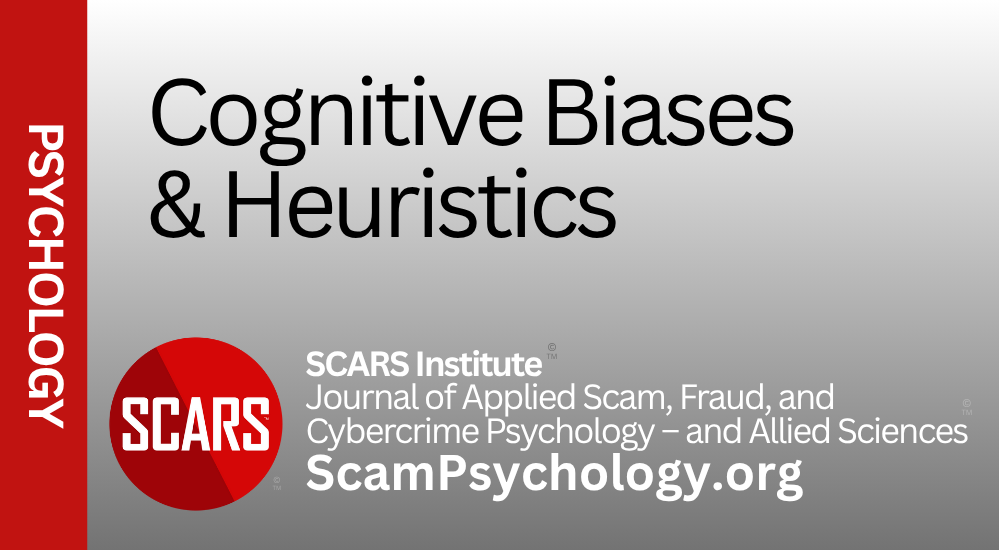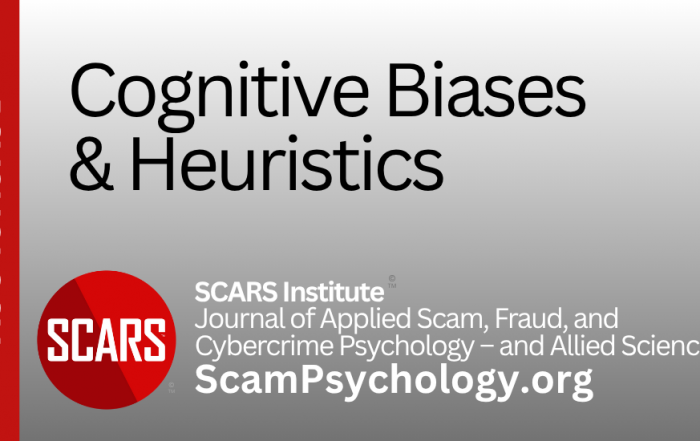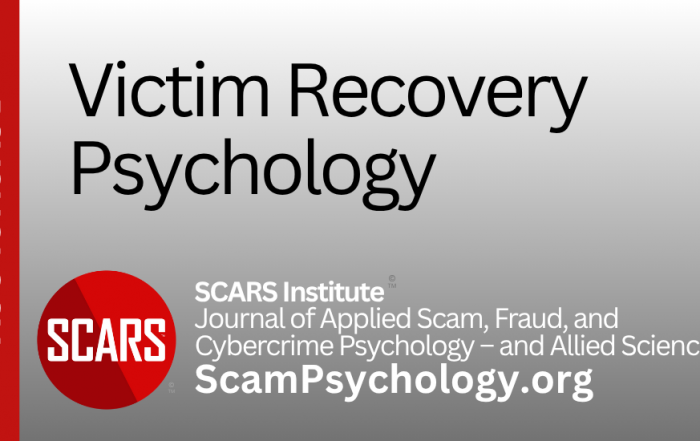Cognitive Bias: Stereotyping Bias
Principal Category: Cognitive Biases
Author:
• Tim McGuinness, Ph.D. – Anthropologist, Scientist, Director of the Society of Citizens Against Relationship Scams Inc.
Stereotyping is a mental tendency (cognitive bias) where individuals categorize others into groups based on characteristics like race, gender, age, or nationality, then apply generalized beliefs or attributes to these groups.
Scammers exploit this bias by tailoring their approach to fit stereotypes, such as posing as Military personnel, wealthy Westerners, Porn stars, or leveraging cultural assumptions, to manipulate victims in relationship scams. They use stereotypes to establish credibility and trust, making victims more susceptible to manipulation.
Post-scam, victims may experience shame and struggle to seek help due to stereotypes about vulnerability. Challenging stereotypes is important to empower victims and prevent further victimization.

The Stereotyping Cognitive Bias: A General Overview and Impact of it during Relationship Scams and on Scam Victims
What is Stereotyping Bias?
Stereotyping cognitive bias is a mental shortcut where individuals categorize others into groups based on characteristics such as race, gender, age, or nationality, and then apply generalized beliefs or attributes to those groups.
Stereotyping beliefs can be positive or negative and are often oversimplified, ignoring individual differences within the group.
Stereotyping arises from the brain’s natural tendency to categorize and simplify information to make sense of the world, but it can lead to unfair judgments and prejudice. This bias can influence perceptions, attitudes, and behaviors, impacting how people interact with others and interpret their actions. Stereotyping is pervasive in society and can occur unconsciously, shaping social interactions, institutional practices, and even policy decisions. Recognizing and challenging stereotypes is essential for promoting fairness, inclusion, and understanding in diverse communities.
How Scammers Use Stereotyping
Using it against Scam Victims
In relationship scams, scammers exploit the Stereotyping cognitive bias by leveraging commonly held beliefs or assumptions about certain groups to manipulate victims. They often tailor their approach to fit these stereotypes, increasing the likelihood of success in their deceptions.
For example, a scammer might pose as a wealthy businessman from a Western country, preying on the stereotype that individuals from affluent nations are trustworthy and financially stable. Alternatively, they might exploit cultural stereotypes by presenting themselves as a romantic interest from a specific ethnic or cultural background, appealing to the victim’s preconceived notions about characteristics associated with that group.
By aligning with these stereotypes, scammers seek to establish credibility, evoke trust, and elicit desired responses from their targets. Victims, influenced by these biases, may be more inclined to overlook red flags or critical thinking and instead rely on stereotypes to guide their judgments and decisions. As a result, they become more vulnerable to manipulation and exploitation by the scammer.
To Justify their Actions
Scammers often exploit the Stereotyping cognitive bias to justify their actions when targeting foreigners in scams.
By perpetuating negative stereotypes about foreign victims, such as portraying them as colonizers, wealthy, naive, or deserving of exploitation, scammers rationalize their criminal behavior. They may argue that targeting foreigners is a form of retribution for perceived injustices or inequalities, exploiting stereotypes to absolve themselves of moral responsibility.
Additionally, scammers may justify their actions by framing scams as a means of survival or economic opportunity in disadvantaged communities, leveraging stereotypes about poverty and desperation to garner sympathy or excuse their criminal behavior. These justifications not only deceive victims but also perpetuate harmful stereotypes and contribute to the perpetuation of corruption in their own country.
The Affect of Stereotyping on Scam Victims
The Stereotyping bias significantly influences scam victims both during and after the scam, shaping their perceptions, behaviors, and emotional responses throughout the experience.
During the Scam
During the scam, victims may be more susceptible to manipulation by scammers who exploit stereotypes to establish credibility and trust.
For example, scammers might conform to cultural or social stereotypes to create a false sense of familiarity and legitimacy, making it easier to deceive victims. Military personnel is one such stereotype, international business people, damsels in distress, etc., are all stereotypical personas impersonated by scammers for this purpose. The victims, influenced by these biases, may overlook warning signs and red flags, leading them to trust the scammer despite potential inconsistencies or suspicions.
After the Scam
After the scam, the effects of stereotyping can persist, impacting victims’ recovery and decision-making processes.
Victims may experience feelings of shame, embarrassment, or self-blame due to realizing they were deceived, which can be made much worse by internalized stereotypes about vulnerability or gullibility. Additionally, victims may struggle to seek help or report the scam due to concerns about being judged or stigmatized based on stereotypes about scam victims. This reluctance to seek support can delay the healing process and prolong the emotional distress experienced by victims.
Also, stereotypes can influence how others perceive and interact with scam victims, shaping the level of empathy, support, and understanding they receive from their social networks, authorities, and the broader community. Negative stereotypes about scam victims, such as portraying them as naive or deserving of their fate, can contribute to victim blaming and minimize the seriousness of the crime, further isolating and marginalizing victims.
Summary
Recognizing and challenging stereotypes is crucial for individuals to protect themselves from falling victim to such scams, as it enables them to critically evaluate the authenticity of the interactions and make informed decisions based on facts rather than assumptions.
Overall, the Stereotyping cognitive bias exerts a profound influence on scam victims, affecting their vulnerability to deception, their experiences during and after the scam, and their interactions with others. Recognizing and challenging stereotypes is essential for recreating empathy, promoting support, and empowering victims to overcome the psychological and social challenges associated with being targeted by scams.
Important Information for New Scam Victims
- See more at www.ScamVictimsSupport.org – a SCARS Website for New Scam Victims
IMPORTANT NOTE: This article is intended to be an introductory overview of complex psychological, neurological, physiological, or other concepts, written primarily to help victims of crime understand the wide-ranging actual or potential effects of psychological trauma they may be experiencing. The goal is to provide clarity and validation for the confusing and often overwhelming symptoms that can follow a traumatic event. It is critical to understand that this content is for informational purposes only and does not constitute or is not a substitute for professional medical advice, diagnosis, or treatment. If you are experiencing distress or believe you are suffering from trauma or its effects, it is essential to consult with a qualified mental health professional for personalized care and support.

Welcome to the SCARS INSTITUTE Journal of Scam Psychology
A Journal of Applied Scam, Fraud, and Cybercrime Psychology – and Allied Sciences
A dedicated site for psychology, victimology, criminology, applied sociology and anthropology, and allied sciences, published by the SCARS INSTITUTE™ – Society of Citizens Against Relationship Scams Inc.
TABLE OF CONTENTS
A Question of Trust
At the SCARS Institute, we invite you to do your own research on the topics we speak about and publish, Our team investigates the subject being discussed, especially when it comes to understanding the scam victims-survivors experience. You can do Google searches but in many cases, you will have to wade through scientific papers and studies. However, remember that biases and perspectives matter and influence the outcome. Regardless, we encourage you to explore these topics as thoroughly as you can for your own awareness.
Please Leave A Comment
Recent Comments
On Other Articles
[better_recent_comments number=”5″ format=”{avatar} on {post}: “{comment}” {date}” avatar_size=”20″]
A Note About Labeling!
We often use the term ‘scam victim’ in our articles, but this is a convenience to help those searching for information in search engines like Google. It is just a convenience and has no deeper meaning. If you have come through such an experience, YOU are a Survivor! It was not your fault. You are not alone! Axios!
Statement About Victim Blaming
Some of our articles discuss various aspects of victims. This is both about better understanding victims (the science of victimology) and their behaviors and psychology. This helps us to educate victims/survivors about why these crimes happened and to not blame themselves, better develop recovery programs, and to help victims avoid scams in the future. At times this may sound like blaming the victim, but it does not blame scam victims, we are simply explaining the hows and whys of the experience victims have.
These articles, about the Psychology of Scams or Victim Psychology – meaning that all humans have psychological or cognitive characteristics in common that can either be exploited or work against us – help us all to understand the unique challenges victims face before, during, and after scams, fraud, or cybercrimes. These sometimes talk about some of the vulnerabilities the scammers exploit. Victims rarely have control of them or are even aware of them, until something like a scam happens and then they can learn how their mind works and how to overcome these mechanisms.
Articles like these help victims and others understand these processes and how to help prevent them from being exploited again or to help them recover more easily by understanding their post-scam behaviors. Learn more about the Psychology of Scams at www.ScamPsychology.org
Psychology Disclaimer:
All articles about psychology, neurology, and the human brain on this website are for information & education only
The information provided in these articles is intended for educational and self-help purposes only and should not be construed as a substitute for professional therapy or counseling.
While any self-help techniques outlined herein may be beneficial for scam victims seeking to recover from their experience and move towards recovery, it is important to consult with a qualified mental health professional before initiating any course of action. Each individual’s experience and needs are unique, and what works for one person may not be suitable for another.
Additionally, any approach may not be appropriate for individuals with certain pre-existing mental health conditions or trauma histories. It is advisable to seek guidance from a licensed therapist or counselor who can provide personalized support, guidance, and treatment tailored to your specific needs.
If you are experiencing significant distress or emotional difficulties related to a scam or other traumatic event, please consult your doctor or mental health provider for appropriate care and support.
Also, please read our SCARS Institute Statement About Professional Care for Scam Victims – here
If you are in crisis, feeling desperate, or in despair please call 988 or your local crisis hotline.
SCARS Institute Resources:
- If you are a victim of scams go to www.ScamVictimsSupport.org for real knowledge and help
- Enroll in SCARS Scam Survivor’s School now at www.SCARSeducation.org
- To report criminals visit https://reporting.AgainstScams.org – we will NEVER give your data to money recovery companies like some do!
- Sign up for our free support & recovery help by https://support.AgainstScams.org
- Follow us and Find our podcasts, webinars, and helpful videos on YouTube: https://www.youtube.com/@RomancescamsNowcom
- SCARS Institute Songs for Victim-Survivors: https://www.youtube.com/playlist…
- See SCARS Institute Scam Victim Self-Help Books at https://shop.AgainstScams.org
- Learn about the Psychology of Scams at www.ScamPsychology.org
- Dig deeper into the reality of scams, fraud, and cybercrime at www.ScamsNOW.com and www.RomanceScamsNOW.com
- Scam Survivor’s Stories: www.ScamSurvivorStories.org
- For Scam Victim Advocates visit www.ScamVictimsAdvocates.org
- See more scammer photos on www.ScammerPhotos.com














![niprc1.png1_-150×1501-11[1]](https://scampsychology.org/wp-content/uploads/2025/05/niprc1.png1_-150x1501-111.webp)
In my case my pig butcher was the stereotypical Chinese businesswoman who was wealthy and an expert in the world of crypto investing. I always felt attracted to Asian women, but now it will be difficult not to think of my pig butcher whenever I meet them in the future. I am aware I will need to work on this.
I now find myself stereotyping the race of who my scammer portrayed. I automatically have a negative feeling toward everyone I encounter of that race. I am traumatized and I have to be more mindful that I am doing this.
For me, my scammer impersonated a trusted celebrity, someone old enough to be my father. This celebrity has a long established history of working in social reform, for educating others in communication and as an actor portraying someone in the Army. I had read his books, listened to his podcast and read much about him on the internet. My belief was that he could be trusted just because of who he is. And because he was older person, that alone made him trustworthy. I had not thought of stereotyping as a method to be exploited by scammers. Or even as a way that I would measure how safe a person or a situation could be.
The criminals who targeted me had an easy task of using stereotypical dialogue based on the support group I had joined. I never suspected their intentions were anything but truthful. And since the crime ended I’ve only told a handful of trusted people (some family, one friend) because of the stereotype associated with scam victims.